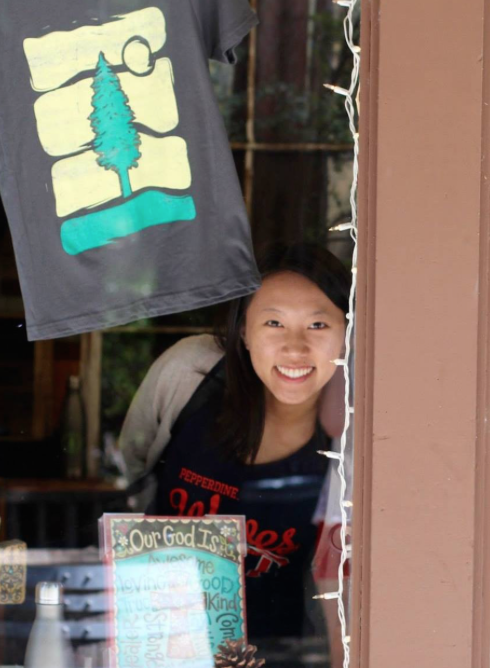
The business world may be brutal and cut-throat, but Pepperdine students are ready to take on the challenges.
Forbes named Pepperdine one of the nation’s most entrepreneurial universities in 2014 because of its strong entrepreneurial courses and emphasis on Christian values. Students are venturing beyond the classroom as they explore the possibilities of turning their business ideas into reality.
“Never accept no for an answer,” Noah Wossen, junior finance major and co-founder of ZippieCookie, said. “That’s when the change comes.”
The million dollar idea
Many successful companies in the market right now started off with just a simple idea. An idea that aimed to improve people’s lives, bring a change or give back to the community.
Zarik Boghossian, visiting professor of entrepreneurship, said he believes that in order for young entrepreneurs to be successful, the idea they are pursuing has to be meaningful.
“Monetary gain should not be the reason why you start a business,” Boghossian said. “If you are passionate about your ideas and your product has real value, then the monetary reward will follow.”
ZippieCookie, the popular late night on-campus cookie delivery business opened for business last spring. It donates 25 percent of its net profit to charities such as Stop Hunger Now, which helps eliminate global food insecurity.
Junior finance major Noah Wossen cofounded the company with sophomore Briana Rusin, a double major in political science and sociology.
“The idea first started when we were freshmen as Briana and I are passionate about world hunger since we both come from backgrounds where the issue is very prevalent,” Wossen said. “My family is from Ethiopia and hers is from Morocco.”
While Wossen and Rusin founded ZippieCookie as a mean of contributing to a cause, Kristina Hsieh, junior integrated marketing communication major, started a company based on a light-bulb moment.
Hsieh founded Coffee Break Inc, an adult coloring book company, with a few of her friends last summer. The idea came to her when she was watching a news anchor reporting on the new craze of coloring books as a tool for stress relief.

“I thought to myself that someone should make a thinner and smaller coloring book,” Hsieh said. “It will not only be more convenient to carry around but also will give you the immediate satisfaction of accomplishment when you finish the book.”
Building a business – network
Having a meaningful and valuable idea is not enough; it must be transformed into an up-and-running business. Amy Adams, director of Pepperdine’s Career Center, stressed the importance of networking for student entrepreneurs.
“Don’t underestimate the power and value of the Pepperdine network,” Adams said. “Leverage faculty, staff and student relationships to test markets and product ideas; gain wisdom and insight about increasing the viability of your business over time.”
Wossen and Rusin said one of the key reasons for their success is they took advantage of resources on campus.
They also credit the growth of ZippieCookie to the nutrition department that has allowed them to use the lab kitchen for daily operations.
“We utilized all available resources to us on campus,” Wossen said. “We spoke to Student Activities, Housing and Residential Life, the deans and student administration and discussed different possibilities.”
Students studying in the business administration department enjoy a rich and diverse alumni network as well as on-campus business organizations that focus on developing student’s professional skills.
Pepperdine’s Entrepreneur Club gives students the opportunity to listen to experts sharing their business experience, lets them consult with more established businesses and develop professional connections, according to the Business division’s website.
Building a business — gain practical skills
Boghossian said learning practical skills, whether from coursework or internship experience, will equip rising entrepreneurs for a more successful future.
“Students who are interested in entrepreneurship tend to pursue majors such as business administration, international business as well as integrated marketing communication,” Boghossian said. “Some of the most popular classes students take are principles of marketing, financial and operations management.”
Boghossian recommends student entrepreneurs take Communication 180 as well as creative writing to improved their communication and writing skills.
“You must be able to present your value with efficiency and passion,” Boghossian said. “The investors not only invest in the product, but they also invest in the individual.”
Hagop Margossian, freshman business administration major, said improving his presentation skills has helped the growth of his business. He founded Spark Sports, a website where fans can find the latest news in the sports world.
“By improving my presentation skills, I was able to articulate my passion to the sponsors who are funding the expansion of my website,” he said.
Margossian said his love for sports is the reason why he started his business.

“The number of writers and contributors is growing everyday,” Margossian said. “We try our best to put out new content frequently and keep the fans updated.”
Ansley Rathgeber, a freshman economy and accounting double major, agreed communication skills are essential to running a business. She founded Squad Creations, a company that sells woven bracelets for $5 each, with a few of her classmates in high school.

Rathgeber started her business based on a school project she did for her introduction to entrepreneurship class. Her passion for service and interest in crafts drove her business idea.
“One dollar of each sale goes toward a charity of our customer’s choice,” Rathgeber said. “And social media was an important key platform for us to communicate that to our customers.”
Building a business – marketing
Networking and skill building can help students build relationships with others who will help with developing their business idea. Marketing helps communicate that idea to the world.
With the development of social media, marketing has shifted its focus to almost entirely digital platforms.
Matilda Donovan, freshman business administration major and YouTube personality, said social media has become a powerful medium for advertising.
“It’s a much more personal way to advertise,” Donovan said. “My viewers value and trust my opinions and also my channel has a specific demographic that many companies are targeting.”
Donovan’s YouTube channel, Primrosemakeup, promotes a healthy lifestyle and teaches beauty tricks to more than three million subscribers. She utilizes Twitter, Instagram and Snapchat to update her viewers on her latest video and to promote her channel.

ZippieCookie’s marketing focuses mostly on Facebook posts and word-of-mouth, Wossen said.
“We are actively searching for a marketing head because that’s our weakest area right now,” Wossen said. “The college demographics is also very hard to target because students are often distracted by too many events.”
Freshman advertising major Jasmine Kim said the biggest challenge with marketing at Pepperdine is differentiation.
“There’s just too much happening on campus,” Kim said. “If your advertisement doesn’t stand out, it’s hard to capture people’s attention.”
Advice for student entrepreneurs
Barry Garapedian, managing director at Morgan Stanley, said he believes that finding the right balance between work and personal life is the key to success.
“I’ve been working for over 30 years,” Garapedian said. “I set aside time to spend with family, or do charity work to ensure my personal growth outside of work.”
Donovan encourages students to be authentic and passionate.
“As cliche as it sounds, just be yourself,” Donovan said. “Your passion will translate through your actions and that’s how you gain audience or customers.”
Although balancing between school and a business might seem challenging, Boghossian believes that college is the best time for students to venture into the professional world.
“Now is the time to take risks,” Boghossian said. “Learning how to fall and then get back on your feet will help you go a long way.”
Sandy Liu completed this story in Dr. Christina Littlefield’s spring 2016 Jour 241 class.



